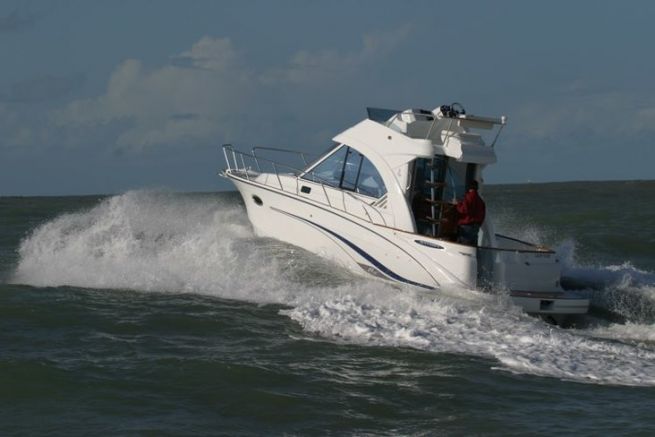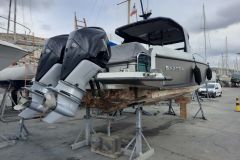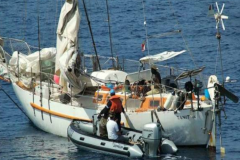According to Europe Assistance, there are about 1200 thefts and acts of vandalism that take place every year on boats (reference year 2016). If we count that less than 5% of stolen boats are recovered, it is undeniable that the trauma and important when such an exaction is perpetuated.
More rentals, less attention
The multiplication of boat rentals, with new renters every week, puts a definitive stop to passive surveillance by harbor masters or managers. Where they knew the legal owners of a boat at least by sight before, they will no longer be surprised to see new people boarding a boat today. The first warning is therefore to take into account the risk to one's own unit and to the community as a whole of this practice.
Solutions exist to minimize the risk of theft. Let's be clear, however, no solution will guarantee you against theft 100%. Even the boat-in-the-garden method, if a thief sets out to steal the object of your dreams, he will succeed. The second warning is that violent or illegal solutions are, by definition, prohibited and should be avoided, as well as being ineffective, and will not be discussed here.

GPS trackers provide reassurance at low cost
The first solution that is most often proposed is based on GPS trackers. Their principle is very simple, installed on board the boat in a place as hidden as possible, the tracker will send its position at regular intervals. This sending can be daily or hourly. In other cases, it may be necessary to send a position only if the boat moves outside a given area. Associated with a suitable telephone package (unlimited SMS), this solution is economical.
The advantages of these solutions? Their low cost (150 to 200 euros for a reliable solution) and the discretion of the system.
Disadvantages include: Need to recharge the battery of the device regularly, false alarms, removal of the device in case of discovery by thieves and lack of discretion. Finally, the coverage is limited to about ten nautical miles from the coast (GSM range).
Presence simulators, electricity left on board
Presence simulators are very popular. They can light up lights on board of boats at specific times or randomly, or trigger a spotlight when a presence is detected on the boat's deck. The simulation can sometimes go further, by turning on the radio for example. Be careful to set up an advanced system that does not turn on the light in broad daylight, for example, at the risk of immediately erasing the surprise effect.
These presence simulation systems have the advantage of being very simple to install and of surprising thieves. They will often be a deterrent for thefts of opportunity, rarely for those that occur in the middle of January.
A major drawback is the need to leave your boat unattended with the electricity connected on board. In other words, there is a risk of fire. Finally, it is plausible that the lighting triggered by a presence detector could be misused because of the presence of a bird or other lawful visitor.
The siren, useless and disturbing
As at home, an intruder alarm can be installed on board the boat. Practical for discouraging unmotivated thieves, these alarms are only useful if they are loud and heard. If the first condition is met, the second is rarely met in a marina of several hectares. And it is not certain that in order to steal the entire boat, it is necessary to enter it!
There are few advantages to these alarm systems, except to couple them with a remote alert system on cell phone and to have the possibility to move quickly to check what is really happening.
There is no shortage of disadvantages to these systems, from the potential inconvenience caused (which will obviate the usefulness of the system) to the lack of triggering, these systems falsely appease the boater.
Automatic cameras, totally gadgets
You told us, when we dealt with the subject of Yacht-Club anti-theft, about the installation of hunting cameras on board boats. These devices, usually installed to photograph wildlife as it passes by, will take a picture of the individual detected on board the boat and send it to you. Useful to build up a gallery of unusable portraits or to photograph gulls on the deck of the boat.
There is no advantage in the anti-theft sense for these devices, which are only rather unlikely gadgets, except to ask the potential thief to take a break.
No major inconvenience, except for the one of uselessness perhaps!
Motion detectors, to be studied closely
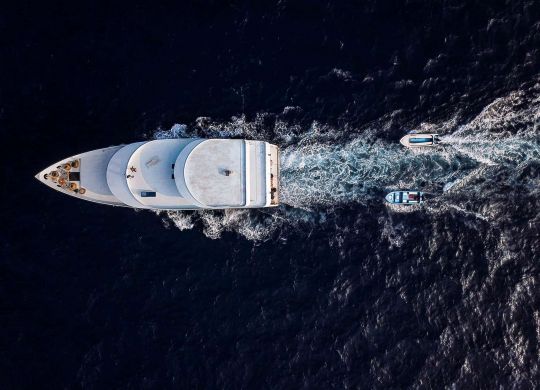
By definition, on water, a boat moves. Quite a bit, actually, but it is rarely stationary. Subject to the tides, more or less important depending on the region, the unit will be quite mobile, within a known perimeter however. The displacement alarms, if properly configured (i.e., coupled with a GPS input), can be a useful ally in discouraging theft. If they only send an SMS or sound a siren, they will not be more effective than the other solutions discussed here. However, when coupled with a fuel shut-off, a steering lock or, for example, an anchor launch, they will be sufficiently disruptive to discourage most thieves.
This movement detection equipment is powerful and versatile. They allow the design of real and effective disturbance scenarios according to realistic situations.
The major disadvantage of these solutions lies in the difficulty to set them up and to script their actions. It is necessary to have good technical skills to put in remote control windlass or fuel arrival and especially, to make sure that what is set up works. Finally, the cost of these devices, which must be DIY (Do It Yourself), can quickly rise. To be reserved for sailing geeks in short!
Solidarity between boaters
We are all present on the pontoons at different times. The idea, therefore, that each of us watches the other's boat is attractive, in the right season. Because let's be honest, we don't go to see our boat much in the middle of February (especially if we live far away from it) and when we do, priority is often given to the work to be done or the control to be carried out rather than to the surveillance of the neighboring boats.
The fact that it is free is an undeniable advantage of this form of surveillance, as is its unpredictability for a thief. This is the flaw in it, not being able to foresee if and when there will be a control makes this surveillance too random to be reliable. And it doesn't work when the boat is rented out, unless you set up a monitoring and warning system for rentals.
We now see WathApp groups that are created at the level of a pontoon or a basin. This makes it possible to alert each other easily, simply and mutually to create a solidarity and an active watch.
The easiest way, remove the bar
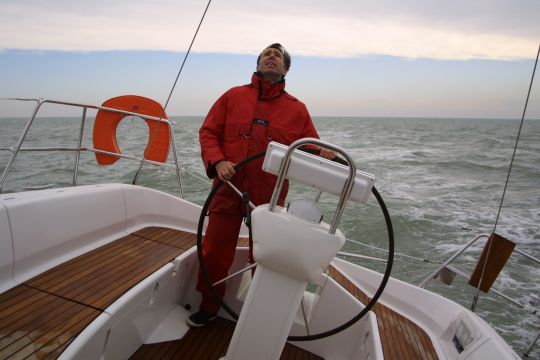
One trick that comes up regularly is to remove the tiller (tiller or wheel). Simple and fast, it confuses, it is the case to say it, the thief who plans to commit his theft on the water by taking the sea. It will not discourage the one who has a crane however, but does this risk exist?
This solution has many advantages. It is free and requires little effort. A bolt and a nut to remove the steering wheel and it can be taken home (of course, leaving it on board the boat is out of the question!).
If there is a drawback to this solution, it is that you have to take the helm home, which can be cumbersome. And to remember to bring it back before going to sea.
Hosting a guest on board
Captain Remi told us about his experience in 2017. He offered to host a homeless person aboard his boat and, obviously, everything went well. If doing such an action on the long term may seem complicated (if only to be able to use his boat in good conditions), doing it with the help of a social or solidarity structure can be an intelligent approach to a leisure reserved for those who can afford it. The association "Les Bureaux du Coeur" proposes this kind of thing to companies, in their unused offices at night.
The advantage of such an arrangement is to organize a permanent presence on board the boat and to discourage theft attempts. Moreover, aired and ventilated, the boat will be maintained in better condition.
There are disadvantages, that is undeniable. The first one is to make sure that the guest is aware of the precariousness of this solution and of the need for you, as the owner of the boat, to be able to use it. The second is the potential condition of the boat. Indeed, depending on the seriousness of the person, surprises can be unpleasant. Finally, check before starting such a thing that your insurer covers you.
If the perfect anti-theft solution certainly does not exist, stratagems can be put in place to reduce the risks. The first is to be randomly present on the boat, to show that it is not abandoned or forgotten. If the boat is not winterized, moving it can also reveal its use and discourage the least determined thieves.
